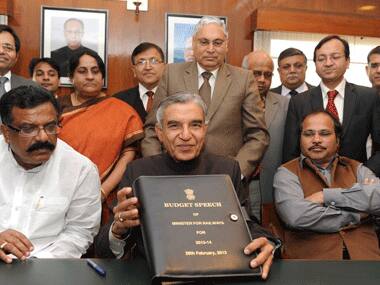When Pawan Kumar Bansal rose to present his maiden Rail Budget today, people looked to him expectantly. After all, it was after 17 years that the railway ministry had returned to the Congress, that too just a year ahead of parliamentary elections. Bansal did the job he was tasked to do by his political bosses: make the right statements about passenger safety and amenities at stations and inside the trains; make e-ticketing more user-friendly; make the right noises about losses and financial viability so that people are not caught off-guard if passenger fares are hiked again any time after the Parliament session ends; hike fares through the backdoor by adding supplementary charges for superfast trains, reservation, clerkage, cancellation and tatkal charges even while claiming that he was not burdening passengers with another fare hike. [caption id=“attachment_640666” align=“alignleft” width=“380”]  Pawan Bansal with the Budget documents. AFP.[/caption] Bansal sought to counter any negativity by promising 1.52 lakh new jobs for young aspirants in the railways this year (or before we go to the polls in March-April 2014). He seemed conscious about keeping public opinion on his side, or at least ensuring that people were not displeased with his effort. However, non-UPA parties strongly protested towards the latter part of his speech once they saw the fineprint. After he was done with the hygiene elements, the rest of the speech was pure politics. If the allies who ran the ministry before him focused their efforts on pandering to their core constituencies, Bansal took the wooing to a different level. He made multiple announcements of projects in the home constituency of Congress President Sonia Gandhi (Rae Bareli), new rail lines and projects for the adjacent constituency held by her son and Congress Vice-President Rahul Gandhi, and the lion’s share of new announcements for Congress-ruled states like Andhra Pradesh and Rajasthan, where the party’s electoral prospects are under stress. Bansal also reserved one or two goodies for his own constituency, Chandigarh. Sample some of the projects announced for the twin constituencies held by Gandhi family, Rae Bareli and Amethi: a new forged wheel factory at Rae Bareli for which an MoU has been signed with Rashtriya Ispat Nigam Ltd; a doubling of the rail line between Rae Bareli and Amethi; new rail lines for Faizabad-Lalganj via Akbarganj, Maharajganj and Rae Bareli; new express trains (Kolkata–Agra, weekly) via Amethi, Rae Bareli, Mathura; a Lucknow-Varanasi Express via Rae-Bareli (six days a week). The list goes on. Soon after Bansal had taken over as Railway Minister on the exit of the Trinamool Congress from the UPA, a long-pending rail coach factory in Rae Bareli was inaugurated by Sonia Gandhi. It was not without reason that he opened his first rail budget speech with customary thanks to his political bosses. “For giving me this opportunity, I am grateful to the Prime Minister Dr Manmohan Singh and the UPA Chairperson, Sonia Gandhi, and pay my homage to the sacred memory of Rajiv Gandhi, who introduced me to the portals of this highest temple of Indian democracy.” The key political sop in an election year came rather quietly when the minister said he would rush to make 1,52,000 new appointments to the already bloated railway workforce of 14 lakh. While lauding the valuable human assets of the Indian Railways, Bansal made this big announcement: “I feel extremely humbled as head of this mammoth organisation which has given so much to the nation and touches the life of each one of us. Some of the measures I propose to take for their welfare are: concerted efforts to fill up approximately 1.52 lakh vacancies this year. It is a measure of popularity of the railways as an employer that a staggering 2.2 crore applications were received. For the first time, railway recruitment examinations were held at more than 60 cities across the country. In the process, a backlog of about 47,000 vacancies earmarked for weaker sections and physically challenged is likely to get cleared.” A humble Bansal made this politically-loaded announcement pass off as a welfare measure. Bansal’s stress on the public-private model and adding manual work to the railways under the Mahatma Gandhi National Rural Employment Guarantee Scheme was fine, but the shifting of the onus for the construction of foot-overbridges (FOBs) near railway stations to state governments drew the ire of various political parties. It was so far considered to be the job of the railway ministry. The railway budget had the imprint of some guiding inputs from the PMO, the finance ministry and the Planning Commission. But the watermark behind it all was that of the party chief.
Pawan Kumar Bansal propitiated the electorate and the Congress ruling deities with lots of railway projects in Rae Bareli and Amethi.
Advertisement
End of Article


)
)
)
)
)
)
)
)
)



